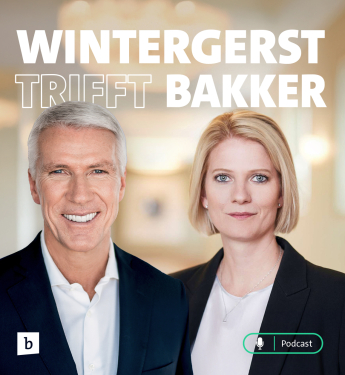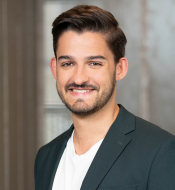
Ralf Wintergerst trifft Lucie Bakker
Das Video zum Podcast
Das ganze Gespräch zwischen Ralf Wintergerst und Dr. Lucia Bakker sehen Sie auch auf YouTube.
Der Podcast „Ralf Wintergerst trifft Lucie Bakker" zum Nachlesen
Ralf Wintergerst:
Dear listeners, welcome to a special edition of our podcast. Today I’m speaking with Lucie Bakker, Chief Claims Officer and Member of the Board of Management at Allianz Group in Germany. We’ll talk about how AI can turn challenges into opportunities for customers.
Lucie, I’m very glad to have you here tonight.
Lucie Bakker:
Thank you, Ralf.
Ralf Wintergerst:
Introducing you is fascinating. I learned things I didn’t know, even though we’ve met privately. You come from Brilon in the German Area “Sauerland”, the same town as Chancellor Merz. After school you quickly left Germany, first studying International Relations at the London School of Economics, then at John Hopkins University’s School of Advanced International Studies in Washington and Bologna. You later earned your doctorate in Frankfurt, worked for the World Bank and then in consulting. Why International Relations? What drove you?
Lucie Bakker:
I wanted to do something good for the world, something lasting for society, change it a little bit. That sounds and was naïve, but it was my motivation. London was exciting, the program was great, and I wanted to understand how international relations and states work together. I thought maybe I could learn how to change things for the better.
Pretty much from the start, I wanted to work for the World Bank – a multilateral organization doing something meaningful. That’s why I chose LSE and later Washington, where many graduates joined the Bank. I focused on conflict management in sub-Saharan Africa and learned how conflicts evolve and how similar the underlying patterns are – whether among families, children, or nations. When I finally joined the World Bank, I realized it’s not always that easy to “do good.”
Ralf Wintergerst:
What was the difficult part?
Lucie Bakker:
I joined World Bank’s department for Sudan, specifically in Darfur, right at the height of the 2006 conflict. I was still in my mid-twenties. We were preparing an assessment to justify €2 billion for infrastructure investments, arguing that the conflict was nearly over. But I had just come from Uganda and knew the opposite was true — the conflict was still escalating. Investing in roads would have helped rebels reach rural areas faster and recruit child soldiers and extort sex slaves.
When I told my boss, he said, “You’re right, but if we don’t pitch for it now, we won’t get the money next year.” That was the moment I decided to leave. I couldn’t stay in a job where doing harm was part of the process.
Ralf Wintergerst:
That’s impressive – standing up for your values instead of giving in.
Lucie Bakker:
Yes. I couldn’t change the system, so I left it.
Ralf Wintergerst:
And then you turned to the “dark side”, to consulting.
Lucie Bakker:
Only the “quasi” dark side. I joined Booz Allen Hamilton, known for a rather empathetic culture. A professor in D.C., Esther Brimmer, advised me to do consulting for two years – to learn and then decide what I really wanted. I ended up staying seven.
Ralf Wintergerst:
What made you join Allianz afterwards?
Lucie Bakker:
After seven years in consulting, I wanted to take responsibility myself, not just advise others. I focused more and more on health insurance and realized you can actually help people in a very concrete way. Allianz approached me and offered a leadership position with 45 people, offering both responsibility and working with people – a big challenge, but I accepted. In consulting, you never have “real” leadership responsibility, you have fluctuating teams.
Ralf Wintergerst:
If you had to describe Allianz briefly?
Lucie Bakker:
Allianz, like insurance in general, is built on the principle of solidarity. It’s about ensuring security when individuals can’t bear risks on their own. That’s why our claim is “We Secure Your Future”. It applies to everything — health, legal protection, accident, anything — all areas where you need stability when something goes wrong.
Ralf Wintergerst:
I asked AI what it thinks of insurance companies. It compared them to elephants – with long memory, a bit stubborn about claims and compensation, but essential. What’s your view?
Lucie Bakker:
It’s not wrong. Insurance companies are like elephants – and that’s good. We rely on data, which is the most important currency of the future. But the emotional value of insurance hasn’t really reached people yet.
Ralf Wintergerst:
You call that “the happy path,” right?
Lucie Bakker:
Yes. The “happy path” is what we call a process that goes right, i. e. optimal. It’s not just about paying every claim. It’s about being fast, transparent, and fair. In order to do so we have to assess every claim, so that there’s no fraud etc.
We analyze our processes with process and task mining to find where things go wrong – where people drop out of digital workflows or switch to manual systems. The goal is to have nearly all cases run smoothly through automated processes, without detours. We also change how we think: we focus on valuable work, cut redundant steps, and make processes intuitive.
Ralf Wintergerst:
So it’s about technology and heart. Let’s look at the processes first. You see a big potential for a savings – also for the benefit of the customer. Insurance companies are really technology companies because you can't solve that without technology. How do you handle the technology? And how do you bring it into the organization?
Lucie Bakker:
You don’t need the newest technology. Julie Sweet, Accenture’s CEO, told me: “You don’t need another use case – you need scale.” You need technology that works across the organization. Many companies have dozens of pilots and use cases that never scale. The real challenge is to make new tools, ideally with the newest technology, part of everyday work.
At Allianz, we once designed theoretically perfect processes, but too many people took “exits” along the way – for example calling instead of using online forms. Then data ends up in the wrong systems. You need leadership to close those gaps and guide everyone onto the same “highway.” We use task and process mining to see where people exit and bring them back on track.
It’s about leadership and transformational mindset: we care and we dare. This is where courage comes in – daring to simplify, to break outdated rules, to celebrate people for trying something new, even when it doesn’t work perfectly. It’s about building a culture where daring is rewarded, not punished – especially in a German company with thousands of rules.
Ralf Wintergerst:
At last year’s Finance & Insurance Summit, you spoke about AI-driven fraud. How do you deal with that?
Lucie Bakker:
It’s a constant race: criminal organisations get smarter, and so do we. You have to invest. AI helps us detect fraud, for example through image recognition. One famous case: Jürgen Klopp smashed his glasses in the 2013 Champions League final. That photo was submitted dozens of times for compensation! Our AI now flags identical or manipulated images immediately.
But fraudsters also use AI to alter invoices, adjust numbers on bills or signatures etc. We have to stay one step ahead. We invest heavily in AI-based fraud detection, and although only about 4 percent of claims are fraudulent, they’re often the expensive ones. It’s an ongoing race, and we have to keep learning.
Ralf Wintergerst:
So, insurance companies may still be elephants – but with good intent.
Lucie Bakker:
Exactly, at least most of them.
Ralf Wintergerst:
Let’s talk about leadership. You’re on the board of Allianz Germany – quite an achievement in your early forties. I find that good leadership means to support others to be successful. What defines good leadership for you?
Lucie Bakker:
It’s about building excellent teams. Every person should be outstanding in their role, not only by skills but also by potential – and you should recruit like that. Don’t shy away from tough conversations or changes when needed. If the team isn’t stellar, you’ll always have to step in yourself. It’s painful but worth it.
Ralf Wintergerst:
And adaptability?
Lucie Bakker:
Be authentic. Don’t fake leadership styles. Changing your mind, listening, and learning are strengths. I regularly sit beside claims handlers all around the world to watch how they work. Only when you experience their reality – the systems, the calls, the stress – you can truly lead and transform. Leaders need to stay close to people, understand their challenges, and then act on what they learn.
Ralf Wintergerst:
One last question: how do you recharge?
Lucie Bakker:
My family gives me energy. I don’t believe in “work-life balance” as a strict concept, it’s about knowing what matters. When work is tough, I go home, deal with everyday life, and build Lego houses with my kids. It’s that mix of giving and taking energy, at home and at work, that keeps me going.
Ralf Wintergerst:
Lucie, it was a great pleasure talking to you.
Lucie Bakker:
Thank you, Ralf.




